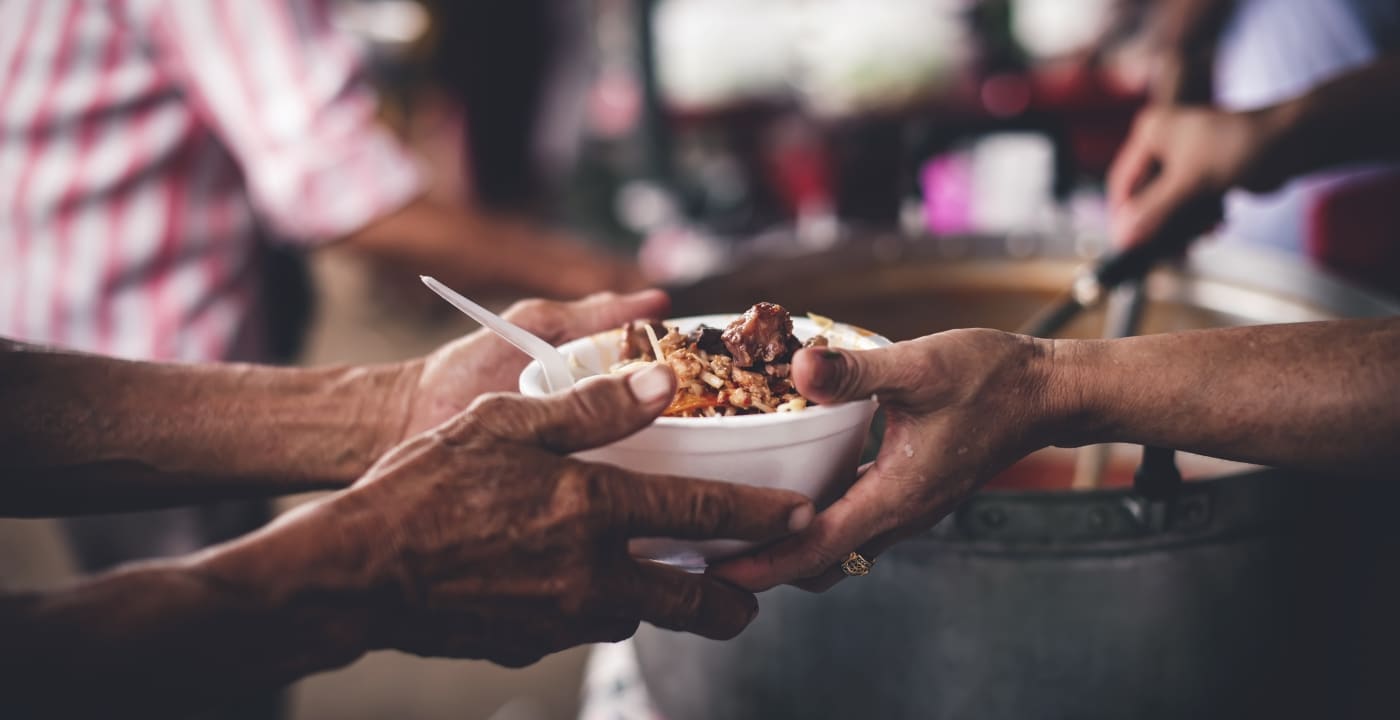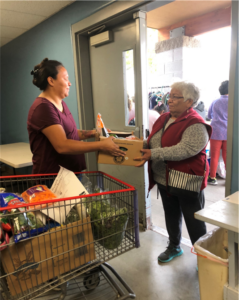Toppenish Community Chest: Access for rural families

At a glance
- Yakima County families commonly face struggles with food access and reliable employment
- The Toppenish Community Chest provides food bank and soup kitchen access, among other services
- To set up families for healthy futures, education and connection are key to their programs
The Yakima region is well-known for impressive crop production. From thousand-acre apple and cherry orchards, to hopvines and grapevines that cover hillsides, to corn and wheat fields that extend for miles, the region is a top producer.
Amid so much crop production, it may be surprising to find that 38 percent of people in the county reported food access as a top need in 2023, according to a Yakima Valley Libraries Community Needs Assessment Study. In families with an average income of less than $25,000 a year, that number jumped to nearly 60 percent.
The main challenge these families face is an unreliable employer — the weather, explains Cecilia Chavez, director of the Toppenish Community Chest.
A steady paycheck for many people in the Yakima region depends on the growing season, which can change from month to month, she says. If weather fluctuates between extremes that aren’t typical for the season, a crop could suffer, meaning less work is available.
With their rural geography, any closure of a business can also mean the loss of hundreds of jobs and limit the number of resources available, she adds. Some of these towns have only one food bank or health clinic.
“We don’t have as many opportunities and organizations around to get help. All of the families are competing for the few services we do have,” Chavez says. “With everything getting so expensive like rent and food, it’s been really hard to make enough to cover just the bills. Food can be even more challenging … a lot of people in our region are also undocumented and don’t qualify for state services.”
The Toppenish Community Chest is working to fill that gap.
Filling the gap
Toppenish Community Chest (The Chest) was formed in 2003, but its food bank roots date back to the 1960s, Chavez explains. These days, The Chest serves as a point of access to a wide range of programs, including food and clothing banks, a Saturday soup kitchen, health and nutrition education, bilingual cooking classes, school supply drives, access to Zumba classes and referrals to outside services like housing and immigration assistance.
The Chest primarily serves the towns of Toppenish, Zillah, Grandview, Granger and Yakima. While some towns have their own food banks, they may not work for everyone’s schedule or provide access to the many other services The Chest does. Chavez works closely with the Yakama Nation to extend resources to the reservation, where support services are also limited.
Over the years, The Chest has cemented themselves as a welcoming and trusted source of assistance in the region. In recognizing that many people may be hesitant to reach out for support given their immigration status, The Chest ensures that all services are free and as confidential as possible, Chavez says. The only requirement to access the food bank is to provide your name and the number of people in your household, and at their Saturday soup kitchen, which serves those facing homelessness, no information is collected — volunteers only count meals served. 
The Chest collaborates with many other community organizations, including churches, the Lions and Rotary clubs, health care providers, county and state agencies, first responders and the Yakima Valley Farm Workers Clinic.
Volunteers are key to making The Chest’s work happen each week, Chavez says. Volunteers and the board of directors staff the food bank every Tuesday from 5-6:30pm to accommodate work schedules and distribute more than 40 meals each Saturday at their soup kitchen.
Despite all the important services they provide, Chavez says it isn’t enough to fix the bigger issues the community faces. There are shelters during extreme weather, but not year-round; patients must travel into Yakima for substance use disorder treatment; and there are limited options for safe and reliable after-school child care, she explains.
“One thing that we always try to say is that we won’t fix it by giving them food and getting them out the door. We need to find a place or service so they can transition into a better path forward,” she says. “We focus on providing for the right now, but our community needs something long term.”
Bringing a healthy spin to tradition
One way The Chest is setting families up for a healthier future is through their bilingual, culturally based cooking classes.
“I’ve always believed that food is medicine, so what you eat is how you will feel and function,” explains Christelle Gorman, program director consultant for The Chest. “Knowledge is power, and a lot of people don’t have the knowledge to make sound nutritional choices. These classes are giving them that opportunity to learn about nutrition and set their family up for success.”
Funded by a grant in 2020, The Chest has so far hosted two nutrition-based cooking classes for women, one in Spanish and one in Ichishkíin (the Yakama Nation language). They focused on using foods that are commonly provided by food banks, or can be sourced locally or purchased with SNAP benefits. They also taught participants how to look for healthier alternatives in the store, like foods with lower sodium or canned fruits with water rather than syrup, Gorman says.
During the eight-week course, the women received tips on how to create healthier versions of their family’s traditional meals and were provided with pots, pans and utensils for cooking at home, as well as tablets to access resources and virtual classes at home, Gorman says.
Families were also signed up for the federal internet cost reduction program and MyChart so they could continue monitoring their family’s health in real time, she adds. A nurse from one of their partner clinics also provided glucose monitoring kits to families, as needed, and education about how to use the kit, understand their numbers and ways to bring down their blood glucose if it’s high.
“In the last couple of years, our schools have been working to address health conditions like obesity, diabetes and high blood pressure,” Chavez says. “There are classes out there, but they’re often hard to understand and not as basic as what our families may need. We want recipes we know and just how to make them healthier and more affordable.”
For example, Gorman explains how they worked to make salmon and certain vegetables that are easily accessible on Yakama Nation lands more approachable. Many of the traditional foods lacked certain flavors or relied on specific ways of preparation — the class focused on adding more nutritional elements like seasoning with lemon or simmering in olive oil instead of something heavier.
“I’m from the Ivory Coast and my food was very important to our culture and remains so for me,” Gorman says. “There’s so much research that suggests we can improve our health by reverting to our traditional foods. It’s important to get back to our original foods and to see how they can be cooked better and learn about the nutritional value behind it.”
“Partnering for healing and a healthy future” is MultiCare’s mission, and it inspires us to form connections that help improve the quality of life for our communities. Community organizations all around us are doing amazing work, and we’re inspired and excited to support that work.
Stories from our Community is an ongoing series conceived to dive into some of these organizations*, bring their stories to life and spread the word about how they are making our communities better.
*Some of the organizations profiled in this series are recipients of MultiCare’s Community Partnership Fund, which awards funds to nonprofit organizations working on initiatives, programs and projects that improve our community.
What's next
- MultiCare community partners are key to meeting all our patients’ needs
- Find food access services and nutrition support in your area
- Looking for a provider? Use our easy find a doctor tool




